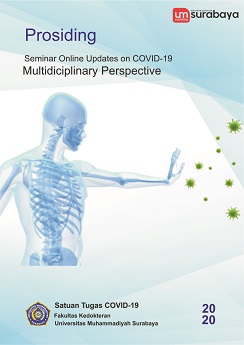Stress dan Kesehatan Mental di Masa Pandemi COVID-19
Abstrak
AbstractCOVID-19 (Corona Virus Infection Disease 2019) is a respiratory tract infection caused by
the novel coronavirus. The disease has spread throughout the world, causing a pandemic. This
condition affects all aspects of life, including social and economic. Uncertainty in all aspects
of life can cause stress. This stressful condition can affect the mental health of an individual so
that it affects their daily activities. Stress can impaired immunity as well as anxiety disorders
and depression. Good stress management and prevention are needed in these circumstances to
reduce the impact of stress on everyday life. Therefore, this literature review aimed to discuss
the effect of stress on mental health during the COVID-19 pandemic.
Keywords: COVID-19, mental health, stress
Referensi
WHO. (2020). Clinical Management of COVID-19 [Internet]. World Health Organization; May.
Tersedia pada: https://www.who.int/publications/i/item/clinical-management-of-covid-19
Kloos, B., Hill, J., Thomas, E., Wandersman, A., Elias, M.J, & Dalton, J.H. (2012). Community
Psychology Linking Individuals and Communities Third Edition. USA: Wadsworth.
Rezvan, Ahmad., & D’Souza, Lancy. (2017). Influence of parenting styles on mental health of
adolescents. European Online Journal of Natural and Social Sciences, 6(4), 667-673.
Neece, C. L., Green, S. A., & Baker, B. L. (2012). Parenting stress and child behavior problems:
a transactional relationship across time. Am Journal Intellectual Developmental Disability,
(1), 48–66. doi:10.1352/1944-7558-117.1.48.
Augustine, Jennifer March., Prickett, Kate C., & Kimbro, Rachel. (2017). Health-related
parenting among u.s. families and young children’s physical health. Journal Marriage Fam,
(3): 816–832. doi:10.1111/jomf.12363.
Gaol, N. T. L. (2016). Teori Stres: Stimulus, Respons, dan Transaksional. Buletin Psikologi,
(1), hal. 1–11. doi: 10.22146/bpsi.11224.
Kiecolt-Glaser, J. K., McGuire, L., Robles, T. F., & Glaser, R. (2002). Emotions, morbidity, and
mortality: New perspectives from psychoneuroimmunology. Annu. Rev. Psychol., 53, 83–107.
Bartlett, D. (1998). Stress: Perspectives and processes. Philadelphia, USA: Open University
Press.
Lyon, B. L. (2012). Stress, coping, and health. In Rice, H. V. (Eds.) Handbook of stress, coping
and health: Implications for nursing research, theory, and practice (pp.3-23). USA: Sage
Publication, Inc.
Staal, M. A. (2004). Stress, cognition, and human performance: A literature review and
conceptual framework. Nasa technical memorandum, 212824, 9.
http://humanfactors.arc.nasa.gov/web/library/publications/publications.php
Spurgeon, A., Jackson, C. A., & Beach, J. R. (2001). The life events inventory: Reâ€scaling based
on an occupational sample. Occupational Medicine, 51(4), 287-293
Serido, J., Almeida, D. M., & Wethington, E. (2004). Chronic stressors and daily hassles: Unique
and interactive relationships with psychological distress. Journal of Health and Social Behavior,
(1), 17-33. doi: 10.1177/002214650404500102.
Rice, V. H. (Ed.). (2011). Theories of stress and its relationship to health. In Rice, H. V. (Eds.),
Handbook of stress, coping, and health: Implications for nursing research,
Jovanovic, J., Lazaridis, K., & Stefanovic, V. (2006). Theoretical approaches to problem of
occupational stress. Acta Facultatis Medicae Naissensis, 23(3), 163-169.
McGuire, L., Kiecolt-Glaser, J. K., & Glaser, R. (2002). Depressive symptoms and lymphocyte
proliferation in older adults. J. Abn. Psychol., 111, 192–197144 | H a l a m a n
Wang, C., Pan, R., Wan, X., Tan, Y., Xu, L., Ho, C.S., Ho, R.C., 2020. Immediate psychological
responses and associated factors during the initial stage of the 2019 coronavirus disease (COVID-
epidemic among the general population in China. Int. J. Environ. Res. Public Health 17 (5),
E1729
Shigemura, J., Ursano, R.J., Morganstein, J.C., Kurosawa, M., Benedek, D.M., (2020). Public
responses to the novel 2019 coronavirus (2019 – nCoV): mental health consequences and target
populations. Psychiatry Clin. Neurosci.
Asmundson, G.J.G., Taylor, S., (2020a). Coronaphobia: fear and the 2019-nCoV outbreak. J.
Anxiety Disord. 70, 102196
Cotton DHG. (1990). Stress Management: An Integrated approach to therapy. New York:
Brunner / Mazel. Inc.
Allen, Tammy D., & Armstrong, Jeremy. (2006). Further examination of the link between workfamily conflict and physical health the role of health-related behaviors. American Behavioral
Scientist, 49(9), 1204-1221.






